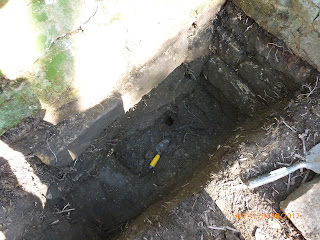On the South side of the first room we excavated (the river side) there's a chunky bit of wall sticking out about a metre towards the river so I started digging down at the intersection of this wall and the main building wall. At the same time Sarah started trying to follow the Mill wall as far as she could in a Westerly direction.
After digging down about 600mm I had found more slag than all the other areas put together then this hole appeared!
It's difficult to describe why one gets excited about this but I certainly did (sad I know), it's probably because there's an expectation that something "not natural" is underneath.
So I dug down further and found more slag, and more and then some more. While certainly not exciting, and actually really hard work to excavate, this does show that the pit I was sinking had once been fresh air and had later been filled by someone for some reason with slag!
While I was doing this Sarah was stealing all the glory by finding this!
An 1870 Victorian penny. Found in the top soil, it tells us little, but was really quite a find.
The following picture gives a good idea of where we are. Photo taken looking East.
And this picture shows the depth to which I have dug so far.
My theory is that we are digging where the original water wheel was housed and that when the process changed from using water powered bellows to using the reverberating cupola, the wheel became redundant and the big hole that was left was simply filled with slag.
What I'm hoping to do is to dig deeper until I find some sort of stone floor on the bottom of the pit, but it's really hard work and I'm not sure how safe the walls of the trench will be if I widen and lengthen it as I will need to if I'm to get deeper. We'll see!





















